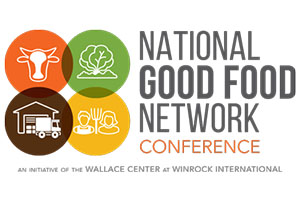
Value Chain Coordination

Roles of Value Chain Coordination: A Development Framework to Bolster Regional Food Value Chains, Entrepreneurship and Community Capacity
Wednesday March 11th, 2:15-3:45
“Soft” or social infrastructure is a critical foundation for developing thriving regional agri-food systems. Matchmaking, providing technical assistance, convening stakeholders, procuring funding, catalyzing new ideas, conducting assessment and advocating for policy, are the activities of Value Chain Coordination (VCC) an emerging framework for place-based development of social infrastructure in agri-food systems and beyond. This panel features 4 professionals from diverse fields: food hub management, city government, for-profit food manufacturing, and non-government economic development, who perform VCC activities around the state of Kentucky. This panel will focus on how VCC is performed individually and collaboratively to develop agri-food value chains in a shared region. Discussion will include successes and challenges, short and long-term impacts, and strategies to fund and organize VCC work. This session will foster networking amongst audience practitioners and stimulate ideas that promote social infrastructure-building VCC activities for developing robust agri-food systems in their own regions.
Speakers: Sarah Rocker, Research Associate, Northeast Regional Center for Rural Development at Penn State, Sarah Fritschner, Local food coordinator, Custom Food Solutions, Aleta Botts, Executive Director, Kentucky Center for Agriculture and Rural Development, Alice Chalmers, Founder, Local Food Connection, Ashton Potter Wright, Director, Local Food & Agricultural Development, City of Lexington
Cap Stacks, Mergers/Acquisitions, and Other Topics We Thought We Were Avoiding
Wednesday March 11th, 4-5:30pm
Good Food finance nerds, assemble! Like it or not, this whole growing the Good Food Movement thing is expensive and complicated. We’re measuring environmental impact, community impact, on-time deliveries, and profit forecasts. We’re managing boards, investors, advisors, and peer-to-peer networks. We’re nonprofits who need profits to scale, or we’re for-profits telling our investors that they’re not getting a return. It’s a lot. Here’s the good news: as our sector evolves, the financial tools we have in our toolkit evolve as well. In 2019, DC- based for-profit benefit corporation 4P Foods acquired the distribution branch of Local Food Hub, a VA-based nonprofit. Making that deal a success required creative financing strategies that brought together philanthropic program-related investment (PRI), convertible notes, traditional equity, and debt. This session will convene food hub practitioners, funders, and finance subject matter experts to talk about mission-based mergers/acquisitions, managing your Good Food cap table, and what the future of food system financing might include.
Speakers: Tom McDougall, Founder/CEO, 4P Foods, Kristen Suokko, Executive Director, Local Food Hub, Kirsten Dueck, Senior Program Officer, PATH Foundation, Olivia Rebanal, Director of Inclusive Food
Many hands make light(er) work: how to plan for regional food systems change
Thursday March 12th, 10:30-12
With the growing understanding that changing the so-called “food system” requires looking beyond cities and reconsidering the idea of ‘local’, regional foodsheds are becoming more of a key focus for government planners, economic developers, and systems change leaders. But how do you manage such massive change across multiple layers of government, in different economic environments, and across sociocultural divides in any one region? Five former Wallace Center Fellows in Regional Food Economies will share approaches and tools they have used to galvanize and advance work in their respective regions in order to design- and build- a more sustainable and efficient foodshed.
Speakers: Elliott Smith, Co-founder, Kitchen Sync Strategies, Luis Nieves-Ruiz, Economic Development Manager, East Central Florida Regional Planning Council, Tera Johnson, Founder & Director, Food Finance Institute, Mike Ortosky, Agriculture Economic Developer, Economic Development Office Orange County, North Carolina, Sibella Krauss, Founder & President, Sustainable Agriculture Education
S’wCenenitel: New Models for allyship and investment in Indigenous led food Sovereignty
Thursday March 12th, 2-3:30
Swcenenitel is an indigenous led initiative to support indigenous food literacy and sovereignty in the South Vancouver Island Region of British Columbia. This initiative was created in collaboration with the 9 nations (Songhees, Esquimalt, Tsartlip/W̱JOȽEȽP, Tseycum/WSIḴEM, Tsawout/SȾÁUTW, Pauquachin/BOḰEĆEN, T’Sou-ke, Scia’new, Pacheedaht) to further the work towards reconciliation and revitalization of traditional food and cultural practices. This workshop will explore the foundations for allyship, the importance of putting resources into the hands of indigenous leaders in a new innovative collaborative accessible funding model as well as supporting the key elements that guide our work: networking and learning, governance, support and celebration.
Speakers: Tiffany Joseph, Swcenenitel Coordinator, Linda Geggie, Exectuive Director, Capital Region Food and Agriculture Initiatives Roundtable (CRFAIR)
Mapping the Food Production System
Friday March 13th, 10-11:30
Food systems practitioners are often tasked with making the case for a stronger regional food system to various constituencies including elected officials, economic development professionals, and urban planners, among others. Developing a regional food systems inventory using Geographic Information Systems (GIS) software can help to facilitate this communication process. This type of tool can help the pubic visualize the expanse and potential of the region’s food systems, including the distribution of agricultural lands, the location of food production businesses (farms, processors, and distributors), and potential markets. Moreover, it can also be used to develop a series of baseline indicators that describe the health of the region’s food systems and potential gaps. During this session, the panelists will discuss the methodologies, challenges, and best practices used to develop their respective GIS-based food systems inventories. They will also discuss how they developed partnerships to assist with data gathering and project outreach.
Speakers: Luis Nieves-Ruiz, AICP, Economic Development Manager, East Central Florida Regional Planning Council, Cynthia Caul, Program Manager Center for Regional Agriculture, Food, & Transformation (CRAFT) Chatham University
